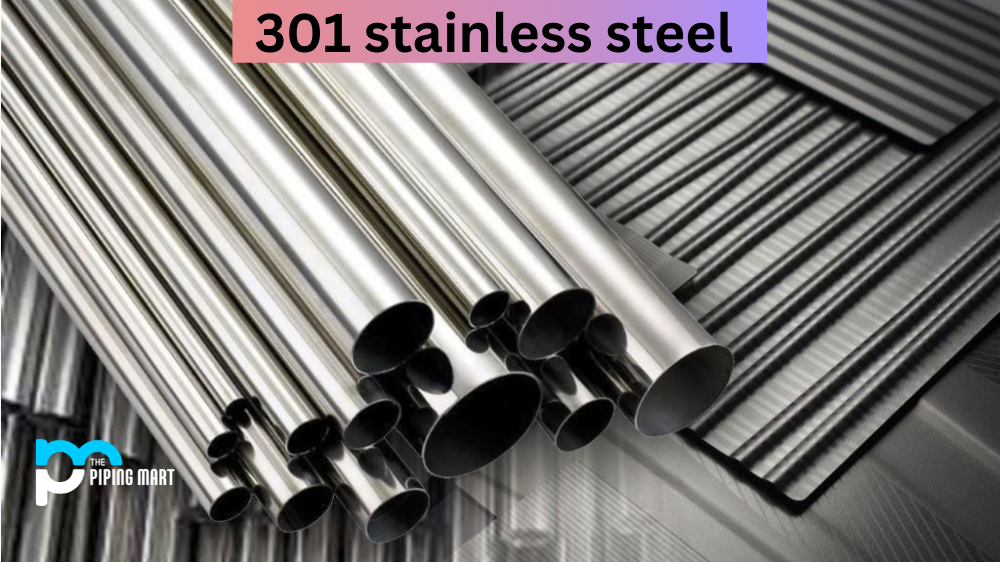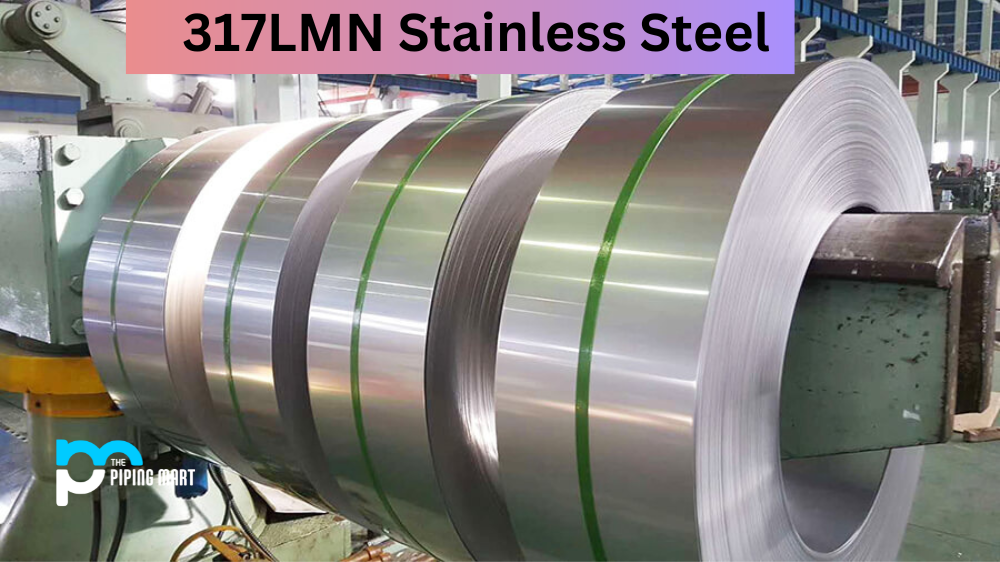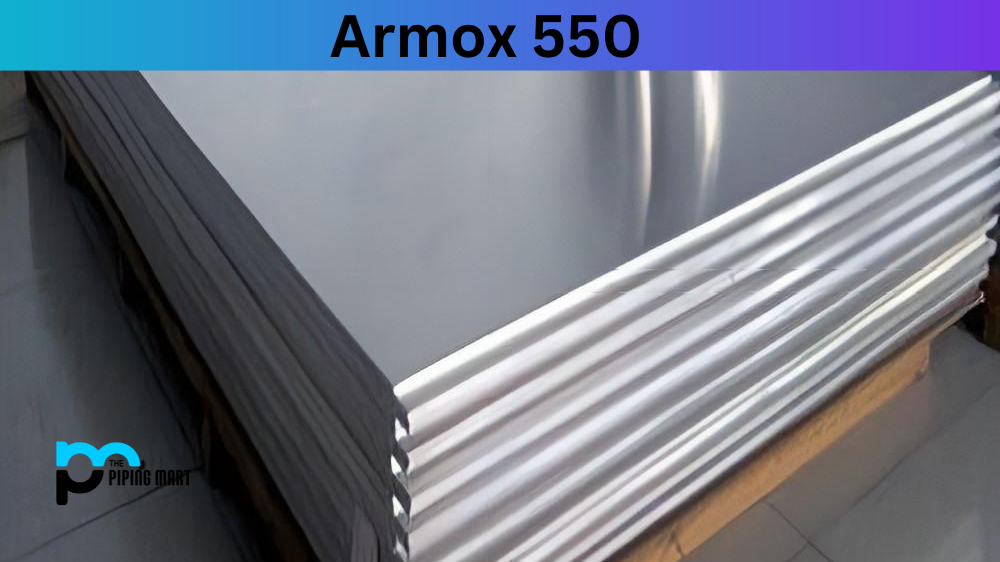If you are looking for a reliable and high-performance metal, then 301 stainless steel might be the perfect option for your needs. This type of stainless steel offers an array of properties that make it suitable for a variety of applications, from industrial equipment to kitchen utensils. Let’s take a look at the properties and uses of 301 stainless steel.
What Forms is 301 Stainless Steel Available at Piping Mart?
- 301 Stainless Steel Nuts
- 301 Stainless Steel Bars
- 301 Stainless Steel Bolts
- 301 Stainless Steel Pipes
- 301 Stainless Steel Screw
- 301 Stainless Steel Tubing
- 301 Stainless Steel Valves
- 301 Stainless Steel Washers
- 301 Stainless Steel Flanges
- 301 Stainless Steel Fasteners
301 Stainless Steel Chemical Composition
UNS S30100 is an austenitic grade alloy that contains 17-19% chromium, 6-8% nickel, and less than 0.15% carbon. It is known for its excellent corrosion resistance and strength in comparison to other stainless steels. The properties of this type of steel also make it good for deep drawing operations such as sinks, pans, and other components used in kitchenware or tableware.
|
Grade |
C |
Mn |
Si |
P |
S |
Cr |
Mo |
Ni |
N |
|
|
301 ASTM A666 |
min. max. |
– 0.15 |
– 2.0 |
– 1.0 |
– 0.045 |
– 0.030 |
16.0 18.0 |
– |
6.0 8.0 |
– 0.10 |
|
301L JIS G4305 |
min. max. |
– 0.03 |
– 2.0 |
– 1.0 |
– 0.045 |
– 0.030 |
16.0 18.0 |
– |
6.0 8.0 |
– 0.20 |
|
1.4318/301LN EN 10088-2 |
min. max. |
– 0.03 |
– 2.0 |
– 1.0 |
– 0.045 |
– 0.015 |
16.5 18.5 |
– |
6.0 8.0 |
0.10 0.20 |
301 Stainless Steel Physical Properties
301 SS is known for its remarkable physical properties, making it an ideal component for construction projects. Versatile and strong, 301 stainless steel can be formed to almost any shape or size, while possessing extraordinary wear and corrosion resistance. Due to its anti-magnetic characteristics, this alloy also provides excellent electrical conductivity. Moreover, the stainless steel maintains its tolerance over a wide range of temperatures and can provide reinforcement to even the most demanding applications. With this combination of strong properties, 301 stainless steel is long-lasting and a great choice when requiring a reliable building material – perfect for any job requiring premium quality items!
|
Grade |
Density (kg/m3) |
Elastic Modulus (GPa) |
Mean Coefficient of Thermal Expansion (μm/m/°C) |
Thermal Conductivity (W/m.K) |
Specific Heat 0-100°C |
Electrical Resistivity (nΩ.m) |
|||
|
0-100°C |
0-315°C |
0-538°C |
at 100°C |
at 500°C |
|||||
|
301 |
7880 |
193 |
16.9 |
17.2 |
18.2 |
16.2 |
21.4 |
500 |
695 |
301 Stainless Steel Mechanical Properties
SS 301 is an extremely versatile material due to its superior mechanical properties. These properties include tensile strength and yield strength, both of which are significantly higher when compared to other standard grades of stainless steel. Additionally, its corrosion resistance is highly robust, in bright oxidizing environments as well as those with low-sulfur gases or chlorine. It also remains stable during high temperatures, making it ideal for use in food preparation applications or heavy equipment exposed to extreme temperatures. To meet the industrial standards for 301 stainless steel, manufacturers must guarantee that the material meets international standards such as ASTM A240/ASME SA240 or EN10088-2.
|
Grade 301 Temper ASTM A666 |
Tensile Strength (MPa) min. |
Yield Strength 0.2% Proof (MPa) min. |
Elongation (% in 50mm) (thick.>0.76mm) min. |
Bend Test (thickness > 1.27mm) |
|
|
Bend Angle (°) |
Factor |
||||
|
Annealed |
758 |
276 |
60 |
– |
– |
|
1/16 Hard |
620 |
310 |
40 |
180 |
1 |
|
1/8 Hard |
690 |
380 |
40 |
180 |
1 |
|
1/4 Hard |
862 |
514 |
25 |
90 |
2 |
|
1/2 Hard |
1034 |
758 |
18 |
90 |
2 |
|
3/4 Hard |
1205 |
930 |
12 |
90 |
3 |
|
Full Hard |
1276 |
965 |
9 |
90 |
5 |
301 Stainless Steel Specifications
- ASTM 666: Standard Specification for Annealed or Cold-Worked Austenitic Stainless Steel Sheet, Strip, Plate, and Flat Bar
- ASTM A240/A240M: Chromium and Chromium-Nickel Stainless Steel Plate, Sheet, and Strip for Pressure Vessels and for General Applications
- ASTM A959: Standard Guide for Specifying Harmonized Standard Grade Compositions for Wrought Stainless Steels
- SAE AMS 5517: Steel, Corrosion Resistant, Sheet and Strip
- SAE J405: Chemical Composition of SAE Wrought Stainless Steels
Heat Treatment
301 stainless steel can be improved through heat treatment processes such as stress relieving or annealing. These processes help to improve the hardness and strength of the material while also reducing any internal stresses which could lead to warping or cracking during machining operations. Additionally, cold working processes can be used to further improve the performance characteristics such as formability or ductility without having to compromise on the strength or hardness qualities that make this type of steel so popular in industrial settings.
301 Stainless Steel Uses
Stainless steel 301 is a type of steel alloyed with chromium and, often, nickel. Among the stainless steels, 301 stainless steel has unique properties that make it ideal for a variety of uses. Not only does this alloy offer excellent corrosion resistance and high strength in cold or heated conditions, but its ductility allows it to be formed into many shapes to fit the needs of any project. It can also have good formability when annealed and is easily weldable. These features make it suitable for a multitude of industrial applications, including use in automotive and trailer parts, aircraft components, kitchenware, decoration trim pieces, and structural components. Indeed, its versatility makes 301 stainless steel one of the most reliable alloys available today.
Due to its excellent corrosion resistance, 301 stainless steel is ideal for use in various industries, including automotive, aerospace, chemical processing, and food processing. Its versatile nature makes it suitable for use in a wide range of applications, such as cookware, kitchen appliances, medical equipment, industrial machinery, and more. Additionally, it can be found in many everyday items like scissors and razor blades due to its hardening properties which allow it to retain its sharpness even after extensive use over time.
Conclusion
To sum up, SS 301 is a highly versatile metal that offers superior strength and corrosion resistance compared to other types of stainless steel on the market today. It has been used extensively across many industries due to its versatility and range of performance benefits offered by heat treatment processes like stress relieving or annealing as well as cold working techniques like deep drawing operations which can further enhance its capabilities even more so than before! With these qualities in mind – there’s no wonder why this type of metal has become one of the most popular choices amongst manufacturers worldwide today!

Abhishek is a seasoned blogger and industry expert, sharing his insights and knowledge on various topics. With his research, Abhishek offers valuable insights and tips for professionals and enthusiasts. Follow him for expert advice on the latest trends and developments in the metal industry.




